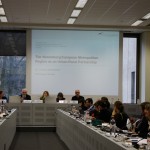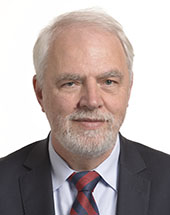URBAN-UITP seminar on Energy Efficiency and Urban Transport Systems
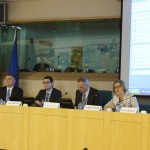 “We should be more smart, more green and we should create jobs” – with these words Lambert van Nistelrooij, Vice-President of the Intergroup, concluded the URBAN Intergroup’s and International Association for Public Transport’s seminar which was held on 4th March in Brussels. Apart from typical transport problems of urbanized areas, the CO2 emission was one of the significant aspects of the discussion, bringing us to a point that partnership in developing public transport is one of the key factors of European success in implementing Europe 2020 strategy.
“We should be more smart, more green and we should create jobs” – with these words Lambert van Nistelrooij, Vice-President of the Intergroup, concluded the URBAN Intergroup’s and International Association for Public Transport’s seminar which was held on 4th March in Brussels. Apart from typical transport problems of urbanized areas, the CO2 emission was one of the significant aspects of the discussion, bringing us to a point that partnership in developing public transport is one of the key factors of European success in implementing Europe 2020 strategy.
Joachim Zeller, member of the URBAN Intergroup, said that urban transport is one of the priorities of European Regional Development Fund. “The members of the European Parliament and especially members of the URBAN Intergroup worked hard during the negotiations of the all structural funds regulations for the programming period 2014-2020. Now, the last step of implementation of the possibilities offered by the European founds is up to the countries governments and local politics”-he added.
URBAN – CEMR working breakfast on Urban Agenda
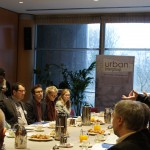 On 19 February, the URBAN Intergroup organised a working breakfast with CEMR’s Thematic Platform on sustainable territorial and local development at the European Parliament.
On 19 February, the URBAN Intergroup organised a working breakfast with CEMR’s Thematic Platform on sustainable territorial and local development at the European Parliament.
The main purpose of this meeting was to stimulate the discussion among MEPs and local authorities and politicians on the future EU Urban Agenda and to draw an outline of such an Agenda, making the link to EU policies and programmes, including cohesion policy, and outlining what local authorities need from the EU to ensure successful delivery of policies on the ground.
“We, Members of the European Parliament active in the URBAN Intergroup, are very happy to notice the growing interest in creating a European urban policy. After many years of discussions about the urban dimension of different European policies, we welcome with satisfaction the on-going reflection by the Commission on what an Urban Agenda should address and how it should be implemented. The question whether it is needed at all, seems to be answered with one voice: yes. The CITIES conference that finished just yesterday showed it clearly, but it also unveiled the different approaches to what an Urban Agenda should be and how it should be shaped. The definition and stimulating the common understanding of it in Europe in the first step for the Commission now.” said during the meeting Jan Olbrycht, President of the URBAN Intergroup.
The working breakfast was jointly organised with the Council if European Municipalities and Regions, one of the partners of the URBAN Intergroup.
RURBAN closing event
On January 28th URBAN Intergroup jointly with the European Commission organized the closing seminar of the preparatory action “RURBAN – sustainable rural-urban partnerships”.
The aim of this seminar was to present the results of RURBAN preparatory action to the European institutions and to discuss the way benefits of rural-urban partnerships can be fully taken into account in the 2014-2020 programming period of cohesion policy and rural development policy.
During the introductory session, Walter Deffaa, Director-General of Regional and Urban Policy, and Jerzy Plewa, Director-General of Agriculture and rural development, underlined a very good cooperation between DG REGIO and DG AGRI on rural-urban partnerships. They stressed the fact that the coincidence between the starting point of the new programming period 2014-2020 and the closing of the RURBAN preparatory action can be a drive for the strengthening of the urban-rural cooperation on the ground. Moreover, they underlined that the results of the RURBAN preparatory action had already an impact in the funds’ regulations for the 2014-2020 programming period.
After the presentation of the rural-urban partnership definition, OECD representatives who conducted a RURBAN comprehensive study, gave answers to two questions: ‘Why urban-rural partnerships are important?’ and ‘How to build an effective urban-rural partnership?’
Regional and local stakeholders insisted on the complexity of peri-urban relations and difficulties in the cooperation. At the same time, they underlined that structural funds offer a unique opportunity to work across peri-urban territories. They welcomed the possibility of using multi-fund programs (ERDF and ESF) which will facilitate implementation of urban-rural partnerships.
Peter Simon, Vice-President of the URBAN Intergroup who initiated this preparatory action, explained that RURBAN “opened a door” for partnerships but that it would only be possible to asses in the future how Member States used this opportunity to develop urban-rural partnerships.
In conclusion, Jan Olbrycht, President of the URBAN Intergroup, asked the European Commission to check urban-rural partnerships while analyzing partnership agreements. “Let’s use European money to put people work together in urban and rural territories”, he added.
More information about RURBAN preparatory action
URBAN Intergroup meeting with EUROCITIES
On November 21st members of the URBAN Intergroup took part in a meeting co-organised with EUROCITIES Metropolitan Areas Working Group. The main topic of the seminar was the presentation and discussion around the report on “Metropolitan Areas in Action”. This report is a work of specialists, from various countries, researching on metropolitan areas. The final report represents 3 years of exchange of knowledge and 1 year of research, ensured by the Metropolitan Institute of Budapest.
First part of the study presents the main findings of the research, whereas the second part focuses on five cases of European metropolitan areas: Lille, Warsaw, Brno, Bratislava and Stuttgart. The report was presented by Peter Austin, the planning advisor at City of Oslo and 15 experts taking part in the MAIA project were present to exchange their experience with the URBAN Intergroup’s members.
Final results arouse much interest and a debate followed with the exchange of opinions and ideas.
“City is like a human being. You cannot impose rules and let it adapt to them. We, people interested in urban development have to work together and we need to cooperate with the urban areas,” said Cristina Gutierrez-Cortinez (EPP/Spain).
The MAIA study also shows that what concerns the metropolitan areas and their further development is their size. Therefore should we adopt a proper legislation for the metropoles?
“Can we say that metropole is a legal status? If we want to give any legal status to these areas firstly we have to discuss more if such status helps? What should count is not the name we give to these areas, but specific processes they are undergoing,” commented and concluded Jan Olbrycht (EPP/Poland).
Launch of UIPI “Landlords in Europe” Report
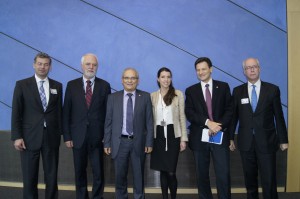 On 12 November 2013 in the European Parliament MEP Jan Olbrycht, President of the European Parliament’s URBAN Intergroup hosted the launch of “Landlords in Europe” Report prepared by the International Union of Property Owners (UIPI).
On 12 November 2013 in the European Parliament MEP Jan Olbrycht, President of the European Parliament’s URBAN Intergroup hosted the launch of “Landlords in Europe” Report prepared by the International Union of Property Owners (UIPI).
The conference brought together more than 60 participants, including MEPs, European Commission and local authorities’ representatives as well as European stakeholders from the industry and the real estate sector. The Landlords in Europe report is a comparative analysis that examines the private rented market in Europe from a practitioner‘s point of view. The report highlights the key issues which landlords face in order to improve the understanding of the legislative frameworks in Member States. The document brings together details on the rental laws, tax regimes and planning policies which govern the private rented sector in twelve countries across Europe.
UIPI is a pan-European association comprising 30 organisations from 28 countries. Jointly, they represent more than five million property owners and some 20 million dwellings. Founded in 1923, its member organisations share the common goal of promoting the rights and interests of private property.

